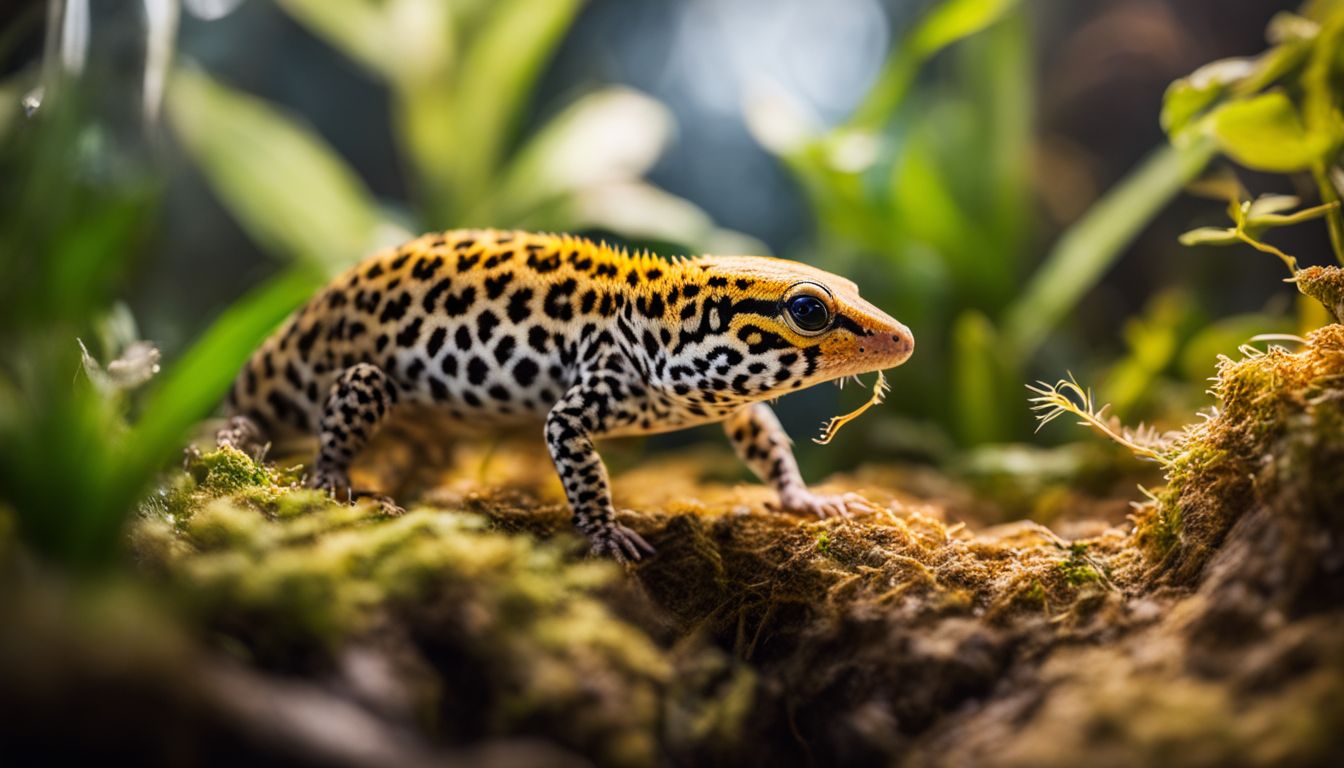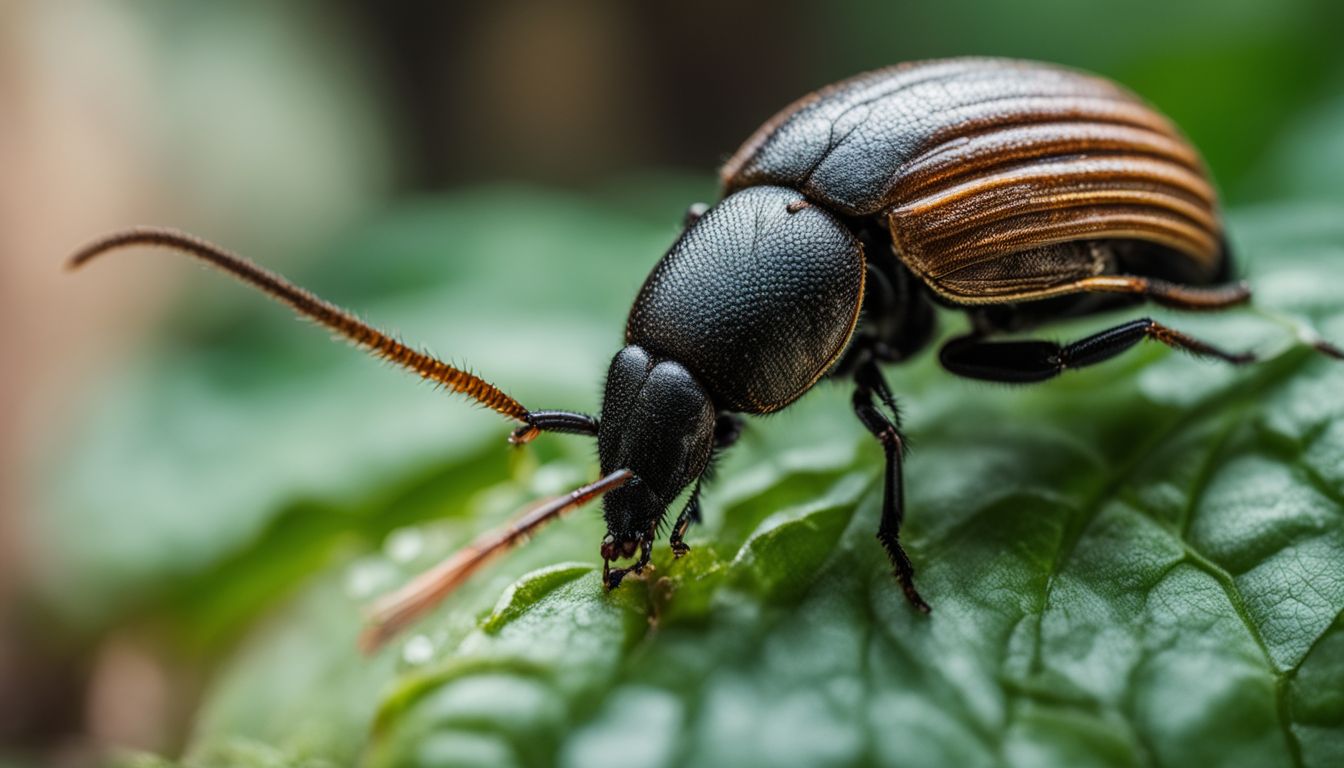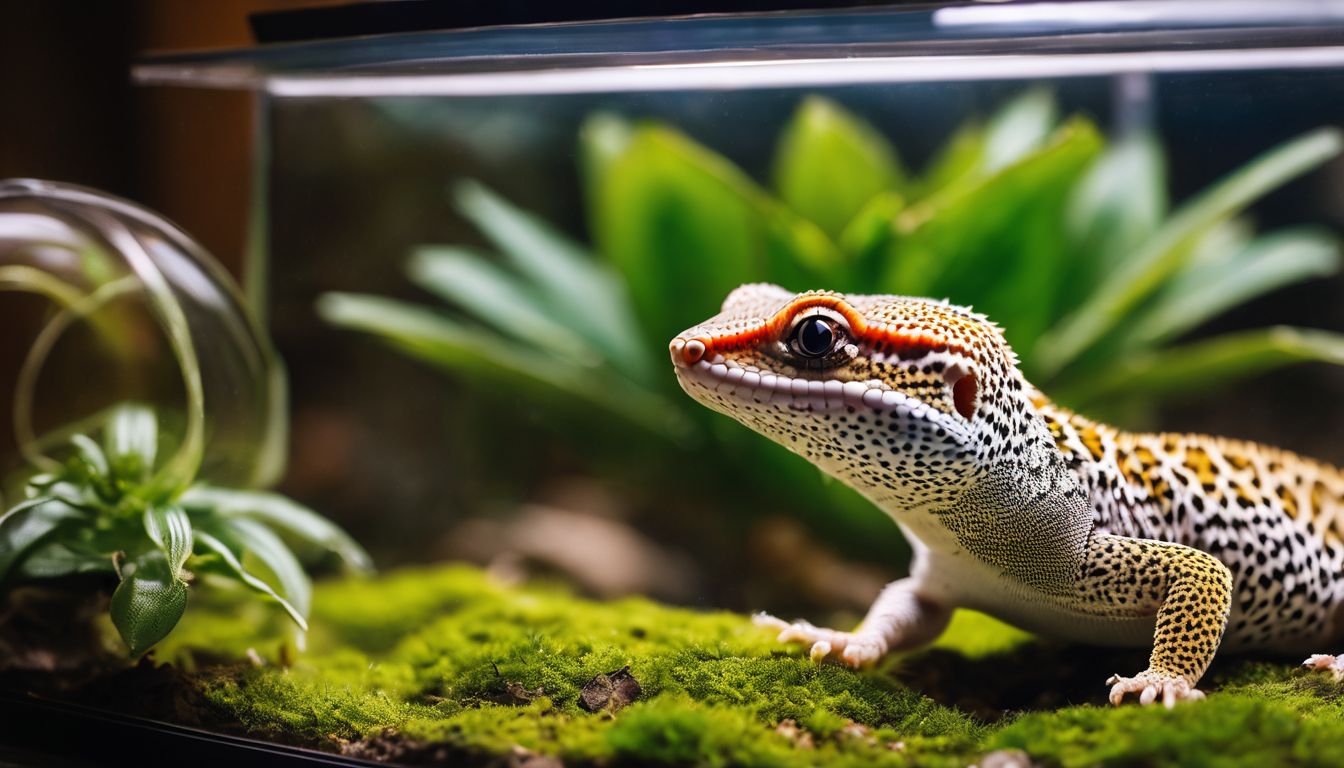As a proud owner of a leopard gecko, you may often find yourself wondering about the best foods to keep your scaly friend healthy and happy. With their cute smiles and curious eyes, these little reptiles have a way of becoming part of the family.
But when it comes to their diet, things can get a bit confusing. You might ask, “Can my leopard gecko munch on beetles just like they do in the wild?” That’s an excellent question!
Leopard geckos are insectivores by nature which means their meals consist mostly of wriggly critters like insects. Here’s something fascinating: they can indeed enjoy beetles as part of their varied diet! In this blog post, we’ll dive deep into what kind of beetles are safe for your gecko and how to feed them properly.
Not only will we cover all the basics, but we’ll also explore some interesting behaviors that come with mealtime for your pet lizard. Ready to learn more? Let’s jump right in!
Key Takeaways
- Leopard geckos can eat beetles as part of their diet, providing essential nutrients and promoting dental health.
- Choosing the right size of beetles is crucial to prevent choking or digestive issues in leopard geckos.
- It’s important to feed beetles in moderation and incorporate calcium supplements to ensure a balanced and nutritious diet for your pet gecko.
Can Leopard Geckos Eat Beetles??

Leopard geckos can eat beetles, but it’s important to consider the suitability and precautions when feeding them these insects. Understanding the nutritional profile and risks of feeding beetles to geckos is crucial for their health and wellbeing.
Suitability of Beetles for Leopard Geckos
Beetles make a good addition to leopard gecko diets. These insects are hard and crunchy, which helps geckos keep their teeth clean. Plus, beetles have calcium, an important nutrient for your pet’s bone health.
Since leopard geckos eat live food, active beetles can be fun for them to chase and catch.
Make sure the beetles you give are not too large for your gecko to handle. Choose ones that are smaller than the space between your gecko’s eyes. This helps prevent choking or digestive problems.
Adding beetles to meals makes eating times more exciting and gives your pet different textures and tastes to enjoy.
Precautions When Feeding Beetles
Even though beetles can be good for leopard geckos, you should be careful when giving them these insects. Here are some tips to make sure your gecko stays safe and healthy:
Understanding the Mealworm Beetle as Gecko Food

Mealworm beetles are a popular option for feeding leopard geckos due to their nutritional profile, but there are also risks involved in including them in your gecko’s diet. It’s important to understand the benefits and potential drawbacks before adding mealworm beetles to your gecko’s feeding routine.
Nutritional Profile of Mealworm Beetles
Nutritional Profile of Mealworm Beetles
Mealworm beetles, often used as food for leopard geckos, possess a nutritional profile that supports the health of these insectivorous pets. These beetles are rich in essential nutrients that contribute to a balanced diet. Here is a summary of their nutritional value:
| Nutrient | Benefit |
|---|---|
| Protein | Supports growth and muscle maintenance |
| Fat | Provides energy and helps in nutrient absorption |
| Fiber | Aids in digestion |
| Moisture | Helps with hydration |
| Calcium | Crucial for bone health and preventing metabolic bone disease |
| Phosphorus | Works with calcium for bone strength and energy metabolism |
Your leopard gecko can benefit from the calcium in beetles, which is vital for preventing common health issues like metabolic bone disease. Always consider the calcium to phosphorus ratio when selecting food, as a balanced ratio promotes better calcium absorption. Beetles offer roughage through their exoskeletons, which helps with your gecko’s digestion. Remember, mealworm beetles should be part of a varied diet that includes other recommended insects like dubia roaches and mealworms to ensure all dietary needs are met. It’s also important to dust insects with calcium supplements if needed to maintain optimal health.
Risks of Feeding Beetles to Geckos
Beetles can be hard for geckos to digest, increasing the risk of digestive issues. Mealworm beetles have a hard exoskeleton that may be difficult for geckos to break down, posing a choking hazard.
If fed in excess, the hard shells of beetles can lead to impaction in leopard geckos.
Understanding the potential risks associated with feeding beetles to your gecko is crucial for their health. Next, let’s explore the best practices for feeding mealworm beetles to leopard geckos.
Feeding Practices for Leopard Geckos
To ensure a balanced diet for your gecko, it’s important to know how to feed beetles to leopard geckos and the ideal size and frequency of beetle feeding. Understanding these feeding practices will help keep your pet healthy and happy.
How to Feed Beetles to Leopard Geckos
To feed beetles to your leopard gecko, follow these steps:
- Offer live beetles to your gecko using feeding tongs or by placing them directly into the feeding area.
- Ensure the beetles are an appropriate size for your gecko – not too large to cause choking and not too small that they are ignored.
- Feed beetles in moderation as part of a varied diet that includes other insects such as dubia roaches and mealworms.
- Consider gut-loading the beetles with nutrient-rich food before offering them to your gecko to enhance their nutritional value.
- Monitor the feeding process to ensure your gecko is consuming the beetles and remove any uneaten insects from the enclosure promptly.
- Dusting the beetles with a calcium supplement before feeding can help meet your gecko’s nutritional needs.
Ideal Beetle Size for Leopard Geckos
When it comes to feeding beetles to leopard geckos, the size of the beetle matters. It is important to choose beetles that are smaller than the space between your gecko’s eyes. This ensures that they can easily swallow the beetle without any risk of choking or digestive issues.
Offering appropriately sized beetles also helps in providing necessary nutrition for your pet.
Choosing small-sized beetles ensures that they are easier for your leopard gecko to consume and digest effectively. Beetles that are too large can pose a risk of choking or becoming impacted in their digestive system, leading to potential health issues for your pet.
Frequency of Beetle Feeding
After considering the ideal size for beetle feeding, it’s important to be mindful of how often leopard geckos should consume beetles. Younger leopard geckos typically require daily feedings as they are growing rapidly and need more nutrients.
Adult geckos can be fed every other day or three times a week, depending on their activity level and appetite. It’s crucial to monitor the frequency of feeding to prevent overfeeding or underfeeding, which can impact the gecko’s health.
Providing a consistent schedule while offering a variety of insects ensures that your leopard gecko receives a balanced diet and maintains optimal health.
Leopard Gecko Behavior and Feeding: Why Does My Leopard Gecko Stare at Me??
Leopard geckos might stare at you because they are curious or trying to figure out if you’re a threat. This behavior is their way of getting familiar with their environment, including you, and it doesn’t always mean something is wrong.
Your gecko’s stare could also indicate hunger. Leopard geckos may gaze at movement when hungry, so make sure they have enough food. Keep an eye on your pet’s feeding habits to ensure they’re getting the right amount of nutrition.
As for other behaviors like waving their tails or making chirping sounds, these are common signs too! Despite having no vocal cords, leopard geckos can produce sound by rubbing body parts together to communicate or defend territory.
Differentiating between normal behavior and potential problems will help in understanding and caring for your leopard gecko better.
Alternatives to Beetles in a Gecko’s Diet
A variety of safe insect options and incorporating fruits and supplements can provide adequate nutrition for leopard geckos. Read on to discover the best feeding practices for your gecko!
Variety of Safe Insect Options for Leopard Geckos
Leopard geckos can eat various insects, providing them with a diverse and nutritious diet. Here are some safe insect options for feeding leopard geckos:
- Dubia Roaches: These insects are high in protein and low in fat, making them an excellent staple food for leopard geckos.
- Crickets: They provide essential nutrients and are readily available at pet stores, making them a convenient choice for feeding.
- Superworms: With a softer exoskeleton than mealworms, superworms are easier for geckos to digest while still being nutritious.
- Black Soldier Fly Larvae: These larvae are rich in calcium and offer a good balance of nutrients for leopard geckos.
- Silkworms: Known for their high protein content, these soft-bodied worms are a great occasional treat for geckos.
- Hornworms: These caterpillars are low in chitin and high in moisture, making them an excellent source of hydration for leopard geckos.
- Waxworms: Although high in fat, they are suitable as an occasional treat due to their soft bodies and sweet taste that entices geckos to eat.
Incorporating Fruits and Supplements
After considering the variety of safe insect options for your leopard geckos, it’s also important to incorporate fruits and supplements into their diet. Here are some essential points to keep in mind:
- Leopard geckos do not eat fruits or vegetables as their bodies can only digest meat, such as insects.
- Calcium supplements may be necessary to ensure your gecko is getting enough nutrients.
- Providing a small dish of calcium powder in the enclosure helps leopard geckos consume it voluntarily.
- Dusting feeder insects with calcium powder before feeding them to your gecko can also help supplement their diet.
- It’s vital to consult a veterinarian who specializes in reptile care for advice on proper supplementation and dosage for your leopard gecko.
- Always ensure that any supplements or vitamins you provide are specifically formulated for reptiles and approved by a professional.
- Proper supplementation along with a balanced insect diet contributes significantly to the overall health and well-being of pet leopard geckos.
Conclusion
In conclusion, feeding beetles to leopard geckos is safe and beneficial. By offering a variety of insects like mealworm beetles, you can provide a balanced and nutritious diet for your gecko.
Monitoring the size of the insects and incorporating calcium supplements as needed are important practices to ensure their well-being. Implementing these simple feeding strategies will contribute to the overall health and happiness of your leopard gecko.
Take action now to provide your pet with a diverse and suitable diet for their thriving life.
If you’ve ever wondered about your leopard gecko’s curious behavior, find out more by reading our article on “why my leopard gecko stares at me.”
FAQs
1. Can leopard geckos eat beetles?
Yes, leopard geckos can eat certain types of beetles like mealworms, waxworms, and crickets as part of their diet.
2. How often should I feed beetles to my leopard gecko?
Beetles can be given to your leopard gecko as an occasional treat but should not make up the primary part of their diet.
3. Should I remove any uneaten beetles from my leopard gecko’s enclosure?
Yes, it’s important to remove any uneaten beetles after feeding time to prevent them from bothering or harming your gecko.
4. What other foods can I offer my leopard gecko besides beetles?
Leopard geckos can also be fed a variety of insects such as crickets, mealworms, super worms, and small locusts; as well as commercial reptile diets and occasional fruit treats.
5. Are there any types of beetles that are harmful for leopard geckos to consume?
Some species of large or hard-shelled beetles may pose a choking hazard or contain toxins that could harm your leopard gecko if consumed; therefore it’s crucial to research which beetle species are safe before feeding them to your pet.




